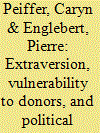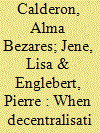| Srl | Item |
| 1 |
ID:
115822


|
|
|
|
|
| Publication |
2012.
|
| Summary/Abstract |
In seeking to maintain their power, many African regimes rely on strategies of extraversion, converting their dependent relations with the external world into domestic resources and authority. This article assesses the relationship between extraversion and political liberalization, a dimension of African democratization that has been somewhat underappreciated in recent empirical studies. African countries vary in their extraversion portfolios, or the dimensions of their relations to the outside world that they can instrumentalize, and these variations correspond both to different degrees of vulnerability to the demands of foreign donors and to different preferences from the donors themselves. We find four quantitative measures of extraversion vulnerability to be statistically associated with the initial transitions of the 1989-1995 period and with the 'consolidations' at different levels of democracy observable between 1995 and 2011. These findings shed new light on both democratic and hybrid regime trajectories in Africa.
|
|
|
|
|
|
|
|
|
|
|
|
|
|
|
|
| 2 |
ID:
064902


|
|
|
| 3 |
ID:
080964


|
|
|
|
|
| Publication |
2008.
|
| Summary/Abstract |
Postconflict state reconstruction has become a priority of donors in Africa. Yet, externally sponsored reconstruction efforts have met with limited achievements in the region. This is partly due to three flawed assumptions on which reconstruction efforts are predicated. The first is that Western state institutions can be transferred to Africa. The poor record of past external efforts to construct and reshape African political and economic institutions casts doubts on the overly ambitious objectives of failed state reconstruction. The second flawed assumption is the mistaken belief in a shared understanding by donors and African leaders of failure and reconstruction. Donors typically misread the nature of African politics. For local elites, reconstruction is the continuation of war and competition for resources by new means. Thus their strategies are often inimical to the building of strong public institutions. The third flawed assumption is that donors are capable of rebuilding African states. Their ambitious goals are inconsistent with their financial, military, and symbolic means. Yet, African societies are capable of recovery, as Somaliland and Uganda illustrate. Encouraging indigenous state formation efforts and constructive bargaining between social forces and governments might prove a more fruitful approach for donors to the problem of Africa's failed states
|
|
|
|
|
|
|
|
|
|
|
|
|
|
|
|
| 4 |
ID:
179295


|
|
|
|
|
| Summary/Abstract |
African regimes commonly use strategies of balanced ethnic representation to build support. Decentralisation reforms, often promoted in order to improve political representation and state access, can undermine such strategies. In this article we use the example of the DR Congo to show the extent to which the multiplication of decentralised provinces is upending a political system largely based until now upon collective ethnic representation in the state. Not only are Congo's new provinces more ethnically homogeneous than their predecessors, but many of them have also witnessed political takeover and monopolisation by the province's dominant ethnic group. In addition, the increased number of Congolese who now find themselves non-autochthonous to their province of residence heightens their vulnerability and the potential for local conflict. Decentralisation, whose intent was proximity to governance, might well end up excluding more Congolese from the benefits of political representation. The article uses original empirical evidence on provincial ethnic distributions to support its claims.
|
|
|
|
|
|
|
|
|
|
|
|
|
|
|
|